RafikiSoft is proud to announce the release of RafikiNet, our flagship business management platform for organizations distributing products in base of the pyramid markets. RafikiNet is a long time in the making and this is a worthwhile occasion to tell the story of inspiration behind its inception.
Last year I spent 6 months working at GCS (Global Cycle Solutions), a social enterprise in Tanzania that develops and disseminates affordable, quality technology for villagers. When I joined, they had recently added solar-powered lanterns to their product line, an item with its strongest demand in areas with little or no access to the electricity grid. As it happens, these are some of the lowest income areas in the country which also have little road and transportation access. All of this makes sales and distribution a formidable challenge to say the least.
Enter the Rafiki
To take this challenge on, the company made two fundamental changes to its business model: The first was to go from a direct sales model to an indirect one, using a microfranchising model. The second was to recruit the microfranchisees from the very same villages to which they were aiming to distribute. Hence was born the “GCS Rafiki Network” (from the Swahili word “rafiki” meaning “friend”). This arrangement significantly reduced the risk and cost of sales to the company, but also created a lucrative new source of income for the villagers themselves.
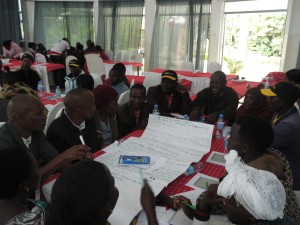
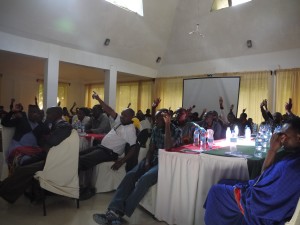
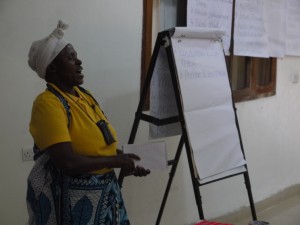
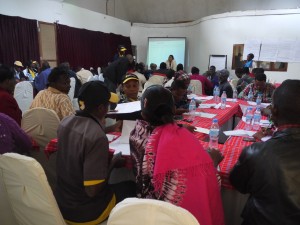
Rafiki new recruit training, August 2013
[Click images to enlarge]
We began with a manageable handful of active sales agents (or “Rafiki”) which were easy enough to keep track of with a couple of spreadsheets shared over Dropbox. A few weeks later, however, we launched a major recruitment drive and the network grew to over 100 active sales agents in a matter of weeks. Our simple Excel/Dropbox tracking system quickly broke down and threatened to put an end to any further growth.
Escaping Spreadsheet Hell
Given my background in the IT and software industry, my first inclination was to look to the market for existing solutions. Unfortunately, I found that most of the relevant products were designed for developed markets. They did not adequately address the unique circumstances we were working with such as poor network connectivity, a lack of a national postal network (or even physical addresses), and the reliance on GSM phones and SMS text for communication. They also failed to take advantage of the prevalence of mobile payment services, such as M-PESA, widely used in East Africa and quickly spreading to other parts of the developing world.
I did find a number of locally developed products that took these unique circumstances into account. Most of these that were usable, however, were what I call “point solutions” – that is, they were good at solving a specific problem in isolation but did little to address the larger context. Users of these products are left to manage and integrate them on their own with a variety of other point-solutions, creating a spreadsheet nightmare of another kind.
I sought out the advice of other companies involved in similar activities and it turned out the story was pretty much the same for them as well. Some persevered in “spreadsheet hell” while others attempted to take matters in their own hands and develop software on their own. In most cases this proved excessively costly and turned into a major distraction from their core business: distributing affordable quality products to villagers.
Silicon Valley, Meet Sub-Saharan Africa
Alas, it appeared there was a major unmet need in this market and it was right in my area of expertise. So last September I teamed up with long time friend and business associate Pushpendra Mohta, and RafikiSoft was born.
Push, who is based in Silicon Valley and builds software platforms, came down from California and we visited with several potential customers and partners in Kenya and Tanzania. We began working on a common way to meet this need and the result is RafikiNet, the first comprehensive business management platform for rural last-mile distributors in developing countries.
We now have social enterprises using our software in places as far flung as Tanzania and Myanmar.
Today, RafikiNet supports the tracking and management of remote sales activity and inventory movement. It provides interactive maps based on GPS data and detailed reports on the performance of critical business drivers as well as their social impact.
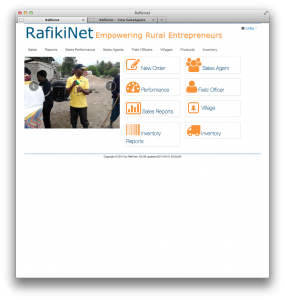
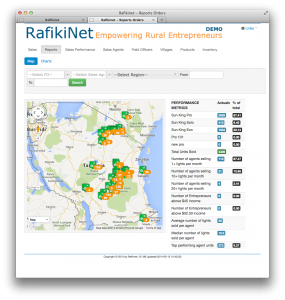
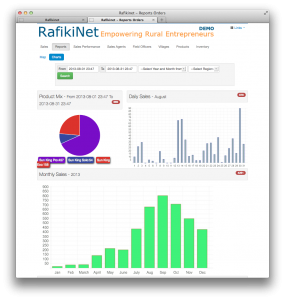
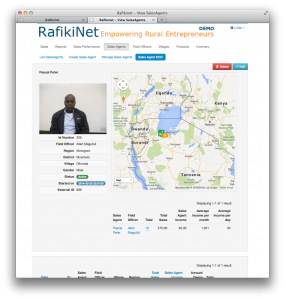
RafikiNet Desktop
[Click on images to enlarge]
Our mobile app allows field agents to register sales and inventory movements directly from the field. They can log village and sales agent information straight into the database with its GPS information.
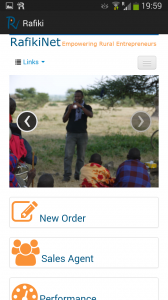
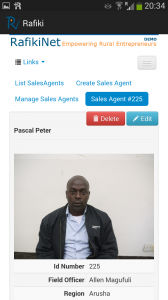
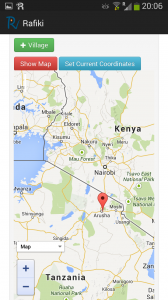
RafikiNet for Android
[Click on images to enlarge]
Our next release integrates mobile payments and provides a limited offline mode for working with intermittent and nonexistent network service coverage.
In Conclusion
With the help of RafikiNet GCS has escaped “spreadsheet hell” and is able to easily track and manage its rapidly growing Rafiki network. They’ve managed to reduce risk and overhead even further using local mobile payment networks to go 100% “cash free” with their sales transactions.
Bottom line, RafikiNet aims to be to software what Land Rover is to transportation.
We are at the very beginning of this amazing journey and we will be chronicling it here in this blog. Join us by following on Facebook, LinkedIn, Twitter, or simply by clicking the “Follow” button on the upper right-hand side of the this page for updates.

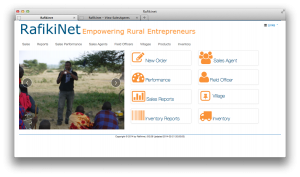

Hi Lee, amazing jump from spreadsheets in a dropbox to Rafikisoft v1.0 enabling sales and inventory transactions via SMS and GPS. I am curious to see what v2.0 will bring. Great work!
Love the journey from why, what if to how, right on the spot what you are proposing.
D
Hi am doing a pilot with Agriculture extension officers its quite tiny about eight individuals .would like to interact with Rafikisoft
Hi Zack, thanks for your message. I will contact you shortly at your email address.
Lee, Wonderful new endeavor. I see your vision and believe great things are ahead. Congratulations!